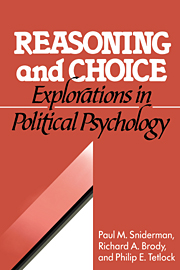Book contents
- Frontmatter
- Contents
- List of tables and figures
- Preface
- 1 Introduction: major themes
- 2 The role of heuristics in political reasoning: a theory sketch
- 3 Values under pressure: AIDS and civil liberties
- 4 The principle–policy puzzle: the paradox of American racial attitudes
- 5 Reasoning chains
- 6 The likability heuristic
- 7 Democratic values and mass publics
- 8 Ideological reasoning
- 9 Information and electoral choice
- 10 Stability and change in party identification: presidential to off-years
- 11 The American dilemma: the role of law as a persuasive symbol
- 12 Ideology and issue persuasibility: dynamics of racial policy attitudes
- 13 The new racism and the American ethos
- 14 Retrospect and prospect
- Notes
- Bibliography
- Subject index
- Author index
9 - Information and electoral choice
Published online by Cambridge University Press: 05 May 2010
- Frontmatter
- Contents
- List of tables and figures
- Preface
- 1 Introduction: major themes
- 2 The role of heuristics in political reasoning: a theory sketch
- 3 Values under pressure: AIDS and civil liberties
- 4 The principle–policy puzzle: the paradox of American racial attitudes
- 5 Reasoning chains
- 6 The likability heuristic
- 7 Democratic values and mass publics
- 8 Ideological reasoning
- 9 Information and electoral choice
- 10 Stability and change in party identification: presidential to off-years
- 11 The American dilemma: the role of law as a persuasive symbol
- 12 Ideology and issue persuasibility: dynamics of racial policy attitudes
- 13 The new racism and the American ethos
- 14 Retrospect and prospect
- Notes
- Bibliography
- Subject index
- Author index
Summary
It cannot be said that everyone thinks that understanding how citizens think is of value. On the contrary, there is a school of analysts who hold either that citizens do not in any substantial sense think about political choices or that, whether they do think about them or not, the only thing worth knowing about citizens is what they do or fail to do. So viewed, the study of public opinion reduces to the analysis of voting.
Most of the chapters in this book focus on what citizens believe and feel. So it seemed to us worthwhile seeing if our overall scheme had any merit applied to voting. The chapter that follows is an initial attempt to do just this. There is much about our application that seems to us incomplete and unsatisfactory. But its limitations notwithstanding, we think it calls attention to the principal question that a theory of voting should address – namely, what are the different ways in which voters make up their mind.
Voting studies have highlighted citizens' low levels of political information – indeed, so much so as to obscure the variance among them. Some members of the public are knowledgeable about politics, follow it closely, understand who stands for what politically; others are ignorant of politics, pay little attention to it, have only a weak grip (or none at all) on who stands for what. So what we should like to explore here is the obvious yet somehow overlooked suggestion that people who are quite well informed about politics and those who pay scarcely any attention to it may not make up their minds about who to vote for in the same way.
- Type
- Chapter
- Information
- Reasoning and ChoiceExplorations in Political Psychology, pp. 164 - 178Publisher: Cambridge University PressPrint publication year: 1991
- 14
- Cited by

